May 28, 2025 | 06:10 GMT +7
May 28, 2025 | 06:10 GMT +7
Hotline: 0913.378.918
May 28, 2025 | 06:10 GMT +7
Hotline: 0913.378.918
How can a brand be built in a way that maintains the core values of the product while strongly connecting with the emotions of customers? This is the challenge that brands need to solve in order to accurately and fully capture the needs of their customers, ensuring they retain their loyalty and affection.
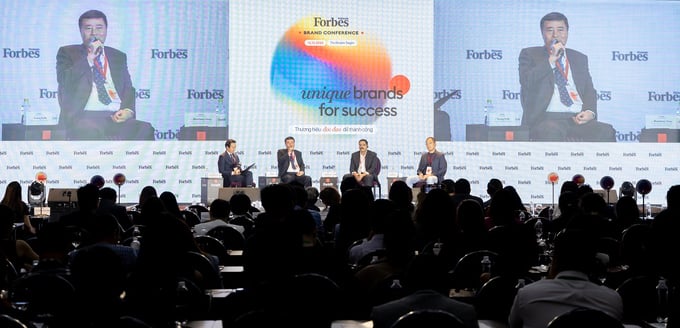
From left to right: Mr. Hoang Ngoc Minh Toan, Vice Chairman of the Board of Directors of PHC Media - Coordinator; Mr. Truong Sy Ba, Chairman of the Board of Directors of Tan Long Group; Mr. Bhardwaj Vinay, Vice Chairman and CEO of Indorama Ventures Vietnam; Mr. Cao Hoai Duong, Chairman of PVOIL.
Developing a brand or creating an emotionally connected brand is a combination of many factors, but all of these elements must be built on the core foundation of quality. As Mr. Truong Sy Ba, Chairman of the Board of Directors of Tan Long Group Joint Stock Company and Chairman of BAF Vietnam Agricultural Joint Stock Company — the enterprise that owns the A AN rice brand and BAF vegetarian-fed pork brand — states: "A brand must make a strong commitment to its consumers".
For food products, quality is defined primarily by the product's ability to meet food safety and hygiene standards, followed by nutritional content, flavor and aesthetic appeal. For example, both A AN rice and BAF vegetarian-fed pork are produced through a comprehensive process that ensures quality at every stage. This process, which is referred to as the "from field, farm to table" approach, includes strict control over each step of production — from sourcing raw materials to the final packaged product that reaches the consumer. This meticulous quality control system provides consumers with confidence in the product’s safety and traceability.
Taking A AN rice as a specific example, this product represents the culmination of a value chain that begins with farmers using scientific methods to cultivate rice. The value chain extends through the stages of storage, processing, and packaging at the rice mill. A AN ensures that every aspect of this chain is monitored and controlled, from selecting high-quality land, choosing the best rice varieties, applying fertilizers and using appropriate pesticides. All production processes are standardized, guiding farmers and cooperatives towards high-value chains, with a focus on market development connections.
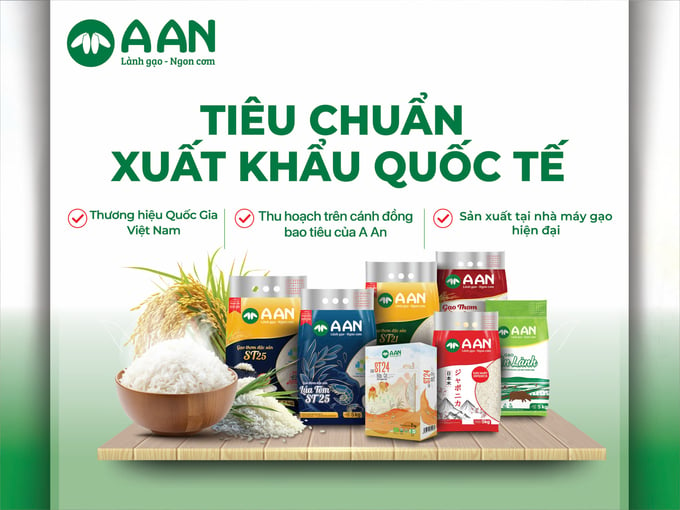
A AN rice has successfully been exported to Japan twice and many other countries.
BAF Vegetarian-Fed Pork, the company exercises full control over every aspect of the input ingredients, developing a unique vegetarian feed formula specifically for the pigs. This means that BAF pigs are fed exclusively with plant-based protein sources such as corn, rice bran and various types of beans, completely excluding any animal-based proteins like bone meal or meat meal, which are commonly found in conventional animal feed.
In addition to this carefully curated diet, the company has established a dedicated system of pig farms designed with high standards of biosecurity to ensure the health and safety of the animals. The farms are managed in a way that minimizes the risk of disease and contamination, creating a controlled and hygienic environment for raising pigs. Furthermore, BAF has invested in modern processing and slaughterhouses that are certified to meet stringent food safety regulations. This approach guarantees that everything related to BAF pork — from the animals' diet to the environment in which they are raised — is under strict supervision and control. As a result, consumers can trace the origin of their pork product with complete confidence, knowing exactly where and how the animals were raised.
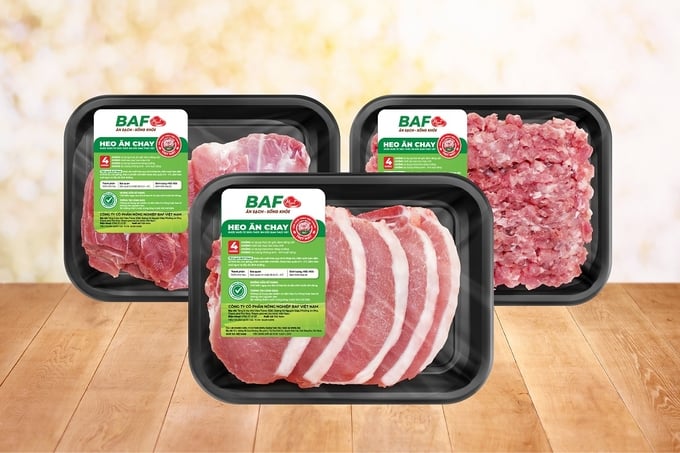
BAF Vegetarian-Fed Pork Brand.
A brand that is built on a foundation of quality is sure to be strong and enduring, but it will lack the ability to make a real impact if it fails to forge a strong emotional connection with its customers. This was one of the key points highlighted by Mr. Truong Sy Ba, along with other distinguished speakers like Mr. Bhardwaj Vinay, Vice Chairman and CEO of Indorama Ventures Vietnam, and Mr. Cao Hoai Duong, Chairman of PVOIL, during the panel discussion titled "Emotionally Connected Brands" held by Forbes.
The story behind the creation of the A AN rice and BAF vegetarian-fed pork brands is closely tied to the widespread consumer frustration with food contamination issues and the company’s determined efforts to provide consumers with products that are “clean from the source".
"In recent years, many Vietnamese businesses have found themselves grappling with the issue of food poisoning and contamination. This has forced businesses to double down on their efforts to ensure consumer trust by building brands that stand out as both unique and reliable. In the agriculture and food sectors, the overall societal trend is moving towards safer consumption, with people increasingly turning to clean, green, and organic products, and supporting a healthier lifestyle", Mr. Truong Sy Ba shared during the panel discussion.
When it comes to the rice industry, despite Vietnam’s prominence as a major exporter, much of the rice exported does not carry a Vietnamese brand. However, A AN rice made history by becoming the first brand to successfully export A AN ST25 rice to Japan in 2022. This was no easy feat, as entering the Japanese market required the rice to meet over 650 stringent quality standards.
In June 2024, A AN continued this success by introducing its Japonica rice line to the demanding Japanese market. This story represents a perfect example of a brand that places quality as its core value, always ensuring that its products not only meet but exceed consumer expectations regarding health and safety. "This is not just about products; it’s about the passion and emotions that the brand stands for", Mr. Ba emphasized.
Similarly, the BAF vegetarian-fed pork brand reflects the company’s commitment to its consumers. The company’s pigs are raised exclusively on vegetarian feed, ensuring that the pork is both tastier and of superior quality. As the market continues to grapple with issues such as contaminated and untraceable meat, BAF’s emphasis on clean meat provides consumers with an alternative that they can trust. By building a brand centered around clean, safe, and healthy products, BAF is helping to shift consumer behavior towards more mindful and health-conscious food choices.
Translated by Phuong Linh

(VAN) World Environment Day 2025 is launched by the United Nations Environment Programme (UNEP) with the theme 'Beat Plastic Pollution'.
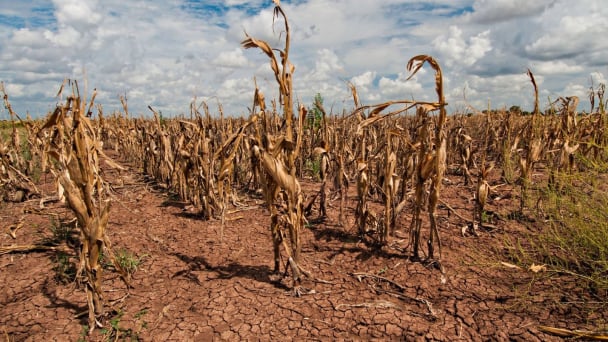
(VAN) As climate whiplash reshapes yields, experts say data-driven tools and targeted relief are critical to feed America.
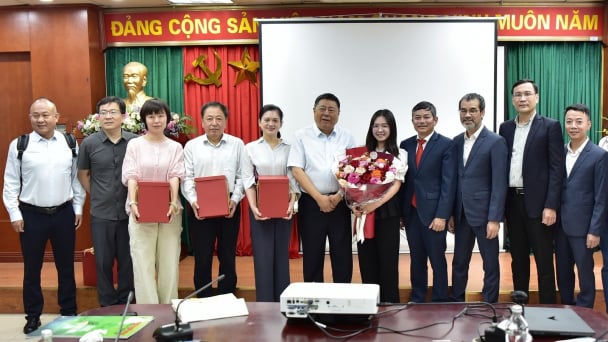
(VAN) The alignment in goals and operational direction between the Vietnam Agriculture and Nature Newspaper and Shaanxi Daily opens up promising prospects for journalism and media cooperation.
/2025/05/26/3422-3-102748_432.jpg)
(VAN) Prime Minister Pham Minh Chinh has been honored as the Distinguished ASEAN Leader at the ASEAN Leadership and Partnership Forum (ALPF) 2025 held in Malaysia, affirming Vietnam’s role and reputation.

(VAN) At WHA78, with health placed at the heart of the global climate storm, Viet Nam enters a new commitment to protect communities from increasingly severe risks.

(VAN) Despite investment costs being 1.5 to 1.8 times higher than conventional methods, multi-story pig farming demonstrates outstanding effectiveness, increasing land-use efficiency by 4 to 10 times.
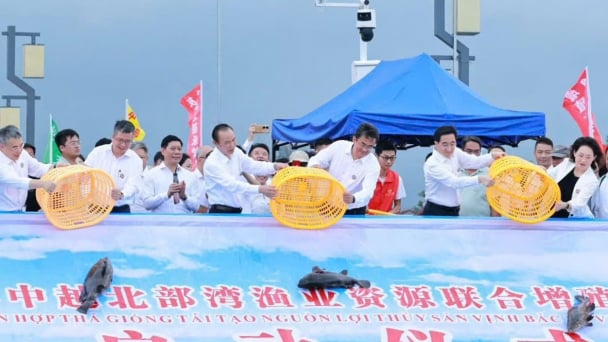
(VAN) Deputy Minister of Agriculture and Environment Phung Duc Tien leads a working delegation to participate in several key activities in China aimed at promoting agricultural and fisheries cooperation.